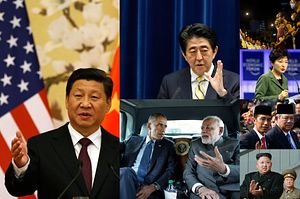Prediction is a risky business: There are few easier ways to look foolish than to have your carefully extrapolated forecasts derailed by the unexpected. Still, while “Events, dear boy, events,” as Harold Macmillan may or may not have said, are often unpredictable, broader trends can be identified and tracked.
Look at the Asia-Pacific in 2014, where the slowing economy in China, political change in India, political trouble in Thailand, the derailing of Abenomics in Japan, and continued maritime tensions in East Asia were all more or less predictable at the start of the year.
So as we move into 2015, we asked our writers and editors to nominate the trends they think we should be watching across the region.
China’s Domestic Affairs
More political infighting, more corrupt “tigers” caged.
In 2015, China will begin preparing for leadership change at the 19th Party Congress due in 2017, when five members of the Politburo Standing Committee (PBSC), excluding Xi Jinping and Li Keqiang, will step down. Barring the unexpected, Hu Chunhua (currently the Party secretary of Guangdong province) and Sun Zhencai (the Party secretary of Chongqing) will get promotions. Other “candidates” will fight over the remaining three seats, and their 2015 performance will be critical.
On the economic and anticorruption fronts, Xi and Li will continue to push for reform, adopting new land reform policies that will allow some village land to enter the marketplace. Also look for real estate registration legislation to come into effect in 2015, a major step in preventing corrupt officials from owning vast property portfolios. We will also see legal judgments against “big tigers” like Zhou Yongkang and Xu Caihou, an historic moment for China’s legal system. Meanwhile, reports of the Zhou Yongkang case provided hints that other “tigers” will find themselves in cages in 2015.
The government will tighten its grip on domestic online media, including social networking platforms like WeChat and Sina Weibo. In 2015, China will speed up the process of passing an intelligence law; that and China’s anti-espionage law will together form a new legal basis for reforming China’s internal security apparatus. In the future, we could see China creating its own versions of the U.S. CIA and FBI.
Finally, Hong Kong and Taiwan remain open questions. The “Occupy Central” movement in Hong Kong and the recent elections in Taiwan will encourage the mainland to change its policies toward both regions. Xi has held to a hardline stance, but he may opt for more flexibility as the year progresses.
































